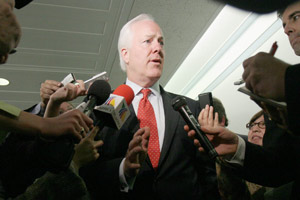The conservative war on earmarks succeeded this month in obstructing the Democrats’ omnibus spending bill—a $1.1 trillion package full of lawmaker-designated spending on pet projects. But even at the height of their renewed anti-earmark crusade, Republicans have been lobbying for exceptions to their proposed ban: Even tea party hero Rep. Michele Bachmann (R-Minn.), for instance, argued that transportation projects should be exempt. In fact, there are a whole slew of workarounds to an earmark ban that could have some undesireable consequences. My colleague Siddhartha Mahanta flags a New York Times story explaining how legislators can quietly lobby federal agencies to funnel spending to pet projects through letters and phone calls—practices cutely known as “lettermarking” and “phonemarking.”
The earmark loopholes are reminscent of what’s happened in Washington since Democrats imposed greater restrictions on lobbying. Rather than reduce lobbying, the new regulations simply drove a lot of activity underground: Official lobbyists have deregistered in droves, so their meetings with legislators don’t have to be subject to the same degree of scrutiny. Instead of meeting with officials at the White House, where their visits must be logged, lobbyists have schmoozed with policymakers over lattes at the coffee shop across the street.
Likewise, the earmarks workarounds are largely invisible, eluding public scrutiny and accountability: as the Times reveals, Sen. Mark Kirk (R-Ill.) sent a letter lobbying the Department of Education to designate funds for a school back home even as he railed against earmarks and federal stimulus spending. So you have a system in which lobbyists can push for pork-barrel spending, and legislators can work to fulfill such requests—both without having to be scrutinized.
As such loopholes are brought to light, it will be even harder for anti-earmark Republicans to dodge charges of hypocrisy. (Lawmakers like Sen. John Cornyn (R-Tex.) have already been accused of as much, having lobbied to include some of the very earmarks in the omnibus spending bill he’s attacked.) What’s more, conservatives have also begun to fear that giving up congressionally designated earmarks will end up ceding too much control over spending decisions to the executive branch. In the end, it’s probably just a matter of time before earmarks lose their stigma and the conservative crusade against the practice wanes once again.
*Update: Post has been truncated from original.









